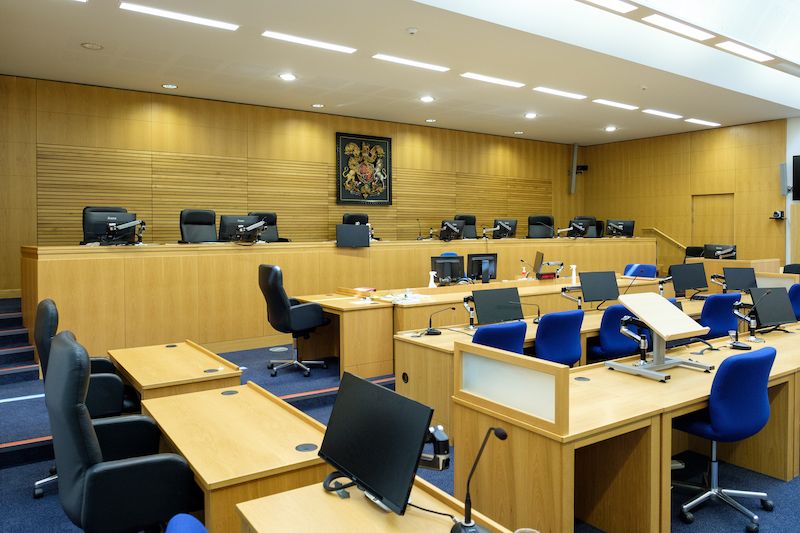


A former police officer accused of intending to pervert the course of justice strongly denied lying to colleagues, the judiciary, and the alleged victim as part of a bid to keep his private life secret as he was questioned in the Royal Court yesterday.
The prosecution case is that Aaron Cusack (26), a police officer between 2016 and 2021, pressured a vulnerable person into withdrawing an allegation of rape, and deviated from best investigating practice while handling the case.
Mr Cusack firmly denies that he exerted unlawful pressure in a face-to-face meeting or looked through their phone to delete data that may have compromised him but accepts that his examining of it goes against standard police procedure.
The court had been told how Mr Cusack failed to disclose contact at multiple points, including messages sent in the summer of 2021, and another set of messages to a relative the vulnerable person. He said he wasn’t aware he needed to disclose friend requests on social media platforms.
He denied he knew it was the vulnerable person who added him on social media in the summer of 2019, only realising when an indecent image of them was received. He said at the time he was receiving multiple friend requests across different social media platforms with slightly different usernames, but close to the name of the vulnerable person, which he found “annoying”.
Mr Cusack said he was using dating apps to find a partner and was “matching” and “chatting” with “a lot of different women” online. He had put his snapchat username in his Tinder biography.
He maintained he reported the picture to professional standards as soon as he received it. The individual from that department who took the call from Mr Cusack had previously submitted to the court they may have documented it improperly as it was apparently not known to other officers.
Advocate Dunford said not only were later messages received not declared, but messages sent by Mr Cusack weren’t either, suggesting he was “leading a secret life”.
Mr Cusack admitted they should’ve been declared but added that “no one asked him” to declare messages he had sent, some of which he accepted were “out of the blue”.
Investigators also found a social media account named “Prev” on Mr Cusack’s devices, which he previously admitted were only used by him. That account had been used to message a relative of the vulnerable person at the same time messages were being sent to them from a separate account by Mr Cusack.
Messages including “you’re fit” and “you’re so beautiful” were sent from the “Prev” account between February and July 2019.
Mr Cusack said he couldn’t recall sending such messages.
When asked why these didn’t come to mind at the start of the investigation, Mr Cusack said he had been busy, stressed, grieving the loss of his father months before, and settling into his new role in CID.
While filling in an obligatory form before handing over the vulnerable person’s phone to the high-tech crime unit for analysis Mr Cusack admitted he had not declared all the relevant social media sites, didn’t declare he had already examined the phone despite being required to do so, and hadn’t finished inputting information before the form was signed by a superior - who he claimed had left the station before its completion.
Snapchat was used for around five minutes after said form had been signed.
“You knew full well there were messages on there,” Advocate Dunford said,
Mr Cusack maintained that he was “100% sure” he wasn’t looking for himself on the phone to see if he was compromised and was instead looking for the name of the suspect to help inform the rape investigation.
Pictured: Mr Cusack had been a police officer for around five years at the time the investigation into him was launched.
One of the first things said by Mr Cusack to the vulnerable person in their one-to-one meeting was that body camera footage had been reviewed from a previous meeting when the rape claim was first considered.
This had to be clarified as it was revealed a day earlier no such footage existed. Mr Cusack said the claim was down to “force of habit”.
Advocate Dunford alleged he had lied as part of efforts to pressure a withdrawal of the complaint. He also put it to him that the private conversation was deliberately constructed to ensure they were alone.
“Within minutes you were straight in there putting pressure on,” he said, adding that Mr Cusack had repeatedly raised the prospect of the vulnerable person being prosecuted or called to court if their allegation was found to be false.
Mr Cusack accepted that someone supporting them should’ve been present when attempting to obtain evidence, but he maintained that he was only “speaking about inconsistencies” within the rape complaint.
The fact he had recorded the conversation was testament to him wanting to be “open and transparent”, and that to him the interview “just felt like having a chat”.
Advocate Dunford suggested claims of openness were “ridiculous” given the failure to disclose information throughout the investigation, and then put it to him that the only way to stop the downloaded data from the phone being examined was to “kill off” the rape complaint “at source”.
The threat of prosecution was not guaranteed, he added. “At what point in police training were you told to do that?”
Mr Cusack said officers are instructed to be honest when dealing with the public.

Pictured: The trial is ongoing at the Royal Court.
Mr Cusack refused to disclose the pin code for his mobile phone, a laptop, and a tablet due to fears of “professional embarrassment”.
He said he had consensual intimate photos, including of colleagues, on them and did not want his employer to see them, and was willing to commit an offence and lose his job by not complying.
Advocate Dunford asked: “Does your privacy mean more than your innocence?”
Mr Cusack said he weighted them equally and made the conscious decision to not comply with the order.
He has already pleaded guilty to three RIPL offences (failing to disclose pass codes).
The prosecution and defence delivered their closing statements today, before Jurats and Lt Bailiff Russell Finch adjourned.
Advocate Andrew Ayres, defending, said his client “did not behave appropriately, but did not behave illegally.”
A verdict will be delivered on Friday morning.
Former police officer allegedly used unlawful methods to force rape claim withdrawal
Comments
Comments on this story express the views of the commentator only, not Bailiwick Publishing. We are unable to guarantee the accuracy of any of those comments.